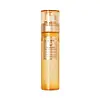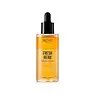What's inside
What's inside
 Key Ingredients
Key Ingredients

 Benefits
Benefits

 Concerns
Concerns

 Ingredients Side-by-side
Ingredients Side-by-side

Water
Skin ConditioningHydrogenated Poly(C6-14 Olefin)
EmollientDipropylene Glycol
HumectantCetyl Ethylhexanoate
EmollientNiacinamide
Smoothing1,2-Hexanediol
Skin ConditioningSodium Chloride
MaskingHoney
HumectantCurcuma Longa Root Extract
MaskingEthylhexylglycerin
Skin ConditioningCaprylyl/Capryl Glucoside
CleansingAdenosine
Skin ConditioningParfum
MaskingDisodium EDTA
Melia Azadirachta Flower Extract
Skin ConditioningGlycerin
HumectantButylene Glycol
HumectantAllantoin
Skin ConditioningMelia Azadirachta Leaf Extract
Skin ConditioningEclipta Prostrata Extract
Skin ConditioningEclipta Prostrata Leaf Extract
Skin ConditioningTocopheryl Acetate
AntioxidantMelia Azadirachta Bark Extract
AntimicrobialCorallina Officinalis Extract
Skin ConditioningLecithin
EmollientMoringa Oleifera Seed Oil
EmollientOcimum Sanctum Leaf Extract
Skin ConditioningBetaine
HumectantLysolecithin
EmulsifyingHydrolyzed Collagen
EmollientButyrospermum Parkii Butter
Skin ConditioningHydrogenated Lecithin
EmulsifyingPhenethyl Alcohol
MaskingMaltodextrin
AbsorbentHydrolyzed Royal Jelly Protein
Skin ConditioningWater, Hydrogenated Poly(C6-14 Olefin), Dipropylene Glycol, Cetyl Ethylhexanoate, Niacinamide, 1,2-Hexanediol, Sodium Chloride, Honey, Curcuma Longa Root Extract, Ethylhexylglycerin, Caprylyl/Capryl Glucoside, Adenosine, Parfum, Disodium EDTA, Melia Azadirachta Flower Extract, Glycerin, Butylene Glycol, Allantoin, Melia Azadirachta Leaf Extract, Eclipta Prostrata Extract, Eclipta Prostrata Leaf Extract, Tocopheryl Acetate, Melia Azadirachta Bark Extract, Corallina Officinalis Extract, Lecithin, Moringa Oleifera Seed Oil, Ocimum Sanctum Leaf Extract, Betaine, Lysolecithin, Hydrolyzed Collagen, Butyrospermum Parkii Butter, Hydrogenated Lecithin, Phenethyl Alcohol, Maltodextrin, Hydrolyzed Royal Jelly Protein
Water
Skin ConditioningMelia Azadirachta Flower Extract
Skin ConditioningCymbopogon Schoenanthus Extract
Skin ConditioningCurcuma Longa Root Extract
MaskingTocopheryl Acetate
AntioxidantDextrin
AbsorbentHydrogenated Polydecene
EmollientCitrus Aurantifolia Oil
CleansingOcimum Sanctum Leaf Extract
Skin ConditioningTheobroma Cacao Extract
Skin ConditioningGlycerin
HumectantNymphaea Alba Flower Extract
Skin ConditioningBetaine
HumectantCetyl Ethylhexanoate
EmollientCitrus Limon Peel Oil
MaskingMelia Azadirachta Leaf Extract
Skin ConditioningEclipta Prostrata Extract
Skin ConditioningMoringa Oleifera Seed Oil
EmollientCitrus Aurantium Dulcis Peel Oil
MaskingSodium Chloride
MaskingMentha Rotundifolia Leaf Extract
TonicEthylhexylglycerin
Skin ConditioningOcimum Basilicum Flower/Leaf Extract
TonicLimnanthes Alba Seed Oil
Skin ConditioningCamellia Japonica Flower Extract
EmollientAloe Barbadensis Leaf Water
MaskingMelia Azadirachta Bark Extract
AntimicrobialCoptis Japonica Root Extract
Skin ConditioningButylene Glycol
Humectant1,2-Hexanediol
Skin ConditioningPearl Powder
Citrus Aurantifolia Peel Extract
CleansingDisodium EDTA
Dipropylene Glycol
HumectantSodium Palmitoyl Proline
Skin ConditioningWater, Melia Azadirachta Flower Extract, Cymbopogon Schoenanthus Extract, Curcuma Longa Root Extract, Tocopheryl Acetate, Dextrin, Hydrogenated Polydecene, Citrus Aurantifolia Oil, Ocimum Sanctum Leaf Extract, Theobroma Cacao Extract, Glycerin, Nymphaea Alba Flower Extract, Betaine, Cetyl Ethylhexanoate, Citrus Limon Peel Oil, Melia Azadirachta Leaf Extract, Eclipta Prostrata Extract, Moringa Oleifera Seed Oil, Citrus Aurantium Dulcis Peel Oil, Sodium Chloride, Mentha Rotundifolia Leaf Extract, Ethylhexylglycerin, Ocimum Basilicum Flower/Leaf Extract, Limnanthes Alba Seed Oil, Camellia Japonica Flower Extract, Aloe Barbadensis Leaf Water, Melia Azadirachta Bark Extract, Coptis Japonica Root Extract, Butylene Glycol, 1,2-Hexanediol, Pearl Powder, Citrus Aurantifolia Peel Extract, Disodium EDTA, Dipropylene Glycol, Sodium Palmitoyl Proline
 Reviews
Reviews

Ingredients Explained
These ingredients are found in both products.
Ingredients higher up in an ingredient list are typically present in a larger amount.
1,2-Hexanediol is a synthetic liquid and another multi-functional powerhouse.
It is a:
- Humectant, drawing moisture into the skin
- Emollient, helping to soften skin
- Solvent, dispersing and stabilizing formulas
- Preservative booster, enhancing the antimicrobial activity of other preservatives
Betaine is a common humectant (a substance that promotes retention of moisture). It's known to be gentle on the skin and can help balance hydration.
This ingredient is best for improving hydration and soothing irritated skin. Studies also show it helps even out skin tone.
Fun fact: Betaine is naturally created in the skin and body. The kind found within cosmetic products can be either plant-derived or synthetic.
Another name for betaine is trimethylglycine.
Learn more about BetaineButylene Glycol (or BG) is used within cosmetic products for a few different reasons:
Overall, Butylene Glycol is a safe and well-rounded ingredient that works well with other ingredients.
Though this ingredient works well with most skin types, some people with sensitive skin may experience a reaction such as allergic rashes, closed comedones, or itchiness.
Learn more about Butylene GlycolCetyl Ethylhexanoate is an emollient ester. It comes from cetearyl alcohol and 2-ethylhexanoic acid.
Cetyl Ethylhexanoate is an emollient that adds a velvety feel to skin without being greasy or oily. Emollients help trap moisture into your skin, keeping your skin soft and hydrated.
Curcuma Longa Root Extract is from the spice, turmeric. Besides being a healthy and delicious spice, turmeric also has plenty of skincare benefits. It has anti-inflammatory, antioxidant, and anti-microbial properties.
Turmeric contains curcumin, an antioxidant. Antioxidants help neutralize unstable free-radical molecules. Free-radical molecules may damage your skin's cells and DNA. Curcumin may help with anti-aging.
Curcumin also has anti-inflammatory properties and can help soothe skin and reduce irritation. On top of that, curcumin has been shown to help prevent hyperpigmentation from sun damage.
The anti-microbial property of turmeric can make it effective in treating acne. This property has also been shown to help regulate the production of sebum.
Learn more about Curcuma Longa Root ExtractDipropylene Glycol is a synthetically created humectant, stabilizer, and solvent.
This ingredient helps:
Dipropylene glycol is technically an alcohol, but it belongs to the glycol family (often considered part of the ‘good’ alcohols). This means it is hydrating and gentle on skin unlike drying solvent alcohols like denatured alcohol.
As a masking agent, Dipropylene Glycol can be used to cover the smell of other ingredients. However, it does not have a scent.
Studies show Dipropylene Glycol is considered safe to use in skincare.
Learn more about Dipropylene GlycolDisodium EDTA plays a role in making products more stable by aiding other preservatives.
It is a chelating agent, meaning it neutralizes metal ions that may be found in a product.
Disodium EDTA is a salt of edetic acid and is found to be safe in cosmetic ingredients.
Learn more about Disodium EDTAThis ingredient is also known as Bhringaraj extract or False Daisy. It has skin conditioning properties and is rich in antioxidants.
Ethylhexylglycerin (we can't pronounce this either) is commonly used as a preservative and skin softener. It is derived from glyceryl.
You might see Ethylhexylglycerin often paired with other preservatives such as phenoxyethanol. Ethylhexylglycerin has been found to increase the effectiveness of these other preservatives.
Glycerin is already naturally found in your skin. It helps moisturize and protect your skin.
A study from 2016 found glycerin to be more effective as a humectant than AHAs and hyaluronic acid.
As a humectant, it helps the skin stay hydrated by pulling moisture to your skin. The low molecular weight of glycerin allows it to pull moisture into the deeper layers of your skin.
Hydrated skin improves your skin barrier; Your skin barrier helps protect against irritants and bacteria.
Glycerin has also been found to have antimicrobial and antiviral properties. Due to these properties, glycerin is often used in wound and burn treatments.
In cosmetics, glycerin is usually derived from plants such as soybean or palm. However, it can also be sourced from animals, such as tallow or animal fat.
This ingredient is organic, colorless, odorless, and non-toxic.
Glycerin is the name for this ingredient in American English. British English uses Glycerol/Glycerine.
Learn more about GlycerinWe don't have a description for Melia Azadirachta Bark Extract yet.
Melia Azadirachta Flower Extract is from the Neem tree. Neem trees originate from India.
Melia Azadirachta Flower Extract contains antioxidants. Antioxidants help fight free-radicals. Free-radicals are molecules that may damage your skin cells, such as pollution.
The flowers of this tree are lilac colored.
Learn more about Melia Azadirachta Flower ExtractMelia Azadirachta Leaf Extract is extract from the neem plant.
The leaves of this tree contain flavonoids and polyphenols. These two compounds are antioxidants, anti-inflammatory, and antibacterial. Further research is needed as to their effects when applied on skin.
Moringa Oleifera Seed Oil is the oil expressed from the seeds of Moringa oleifera plant. It is more commonly known as Moringa seed oil.
Moringa seeds have antioxidant, anti-inflammatory, and skin hydrating properties. These seeds are rich in oils, proteins, monounsaturated fats, and tocopherols.
As an emollient, moringa seed oil helps trap moisture in the skin by creating a film on top. This helps keep your skin hydrated and soft.
Many compounds in moringa seed oil are antioxidant and anti-inflammatory. These compounds include Vitamin E. , catechins, ferulic acid, and more.
Another compound found in Moringa seed oil is oleic acid.
Moringa trees are native to the Himalayan mountains.
This ingredient may not be fungal-acne safe.
Learn more about Moringa Oleifera Seed OilOcimum Sanctum Leaf Extract comes from the Holy Basil plant. Holy Basil is native to India.
Holy Basil is rich in antioxidants due to its high romarinic acid, ferulic acid, and rutin content. This gives it skin brightening and soothing properties.
While Holy Basil has many claims to help fight acne, more research is needed.
One thing to note is the presence of tannins; tannins are naturally found in nature. However, this compound may be skin-sensitizing.
Learn more about Ocimum Sanctum Leaf ExtractChances are, you eat sodium chloride every day. Sodium Chloride is also known as table salt.
This ingredient has many purposes in skincare: thickener, emulsifier, and exfoliator.
You'll most likely find this ingredient in cleansers where it is used to create a gel-like texture. As an emulsifier, it also prevents ingredients from separating.
There is much debate on whether this ingredient is comedogenic. The short answer - comedogenic ratings don't tell the whole story. Learn more about comegodenic ratings here.
The concensus about this ingredient causing acne seems to be divided. Research is needed to understand if this ingredient does cause acne.
Scrubs may use salt as the primary exfoliating ingredient.
Learn more about Sodium ChlorideTocopheryl Acetate is AKA Vitamin E. It is an antioxidant and protects your skin from free radicals. Free radicals damage the skin by breaking down collagen.
One study found using Tocopheryl Acetate with Vitamin C decreased the number of sunburned cells.
Tocopheryl Acetate is commonly found in both skincare and dietary supplements.
Learn more about Tocopheryl AcetateWater. It's the most common cosmetic ingredient of all. You'll usually see it at the top of ingredient lists, meaning that it makes up the largest part of the product.
So why is it so popular? Water most often acts as a solvent - this means that it helps dissolve other ingredients into the formulation.
You'll also recognize water as that liquid we all need to stay alive. If you see this, drink a glass of water. Stay hydrated!
Learn more about Water